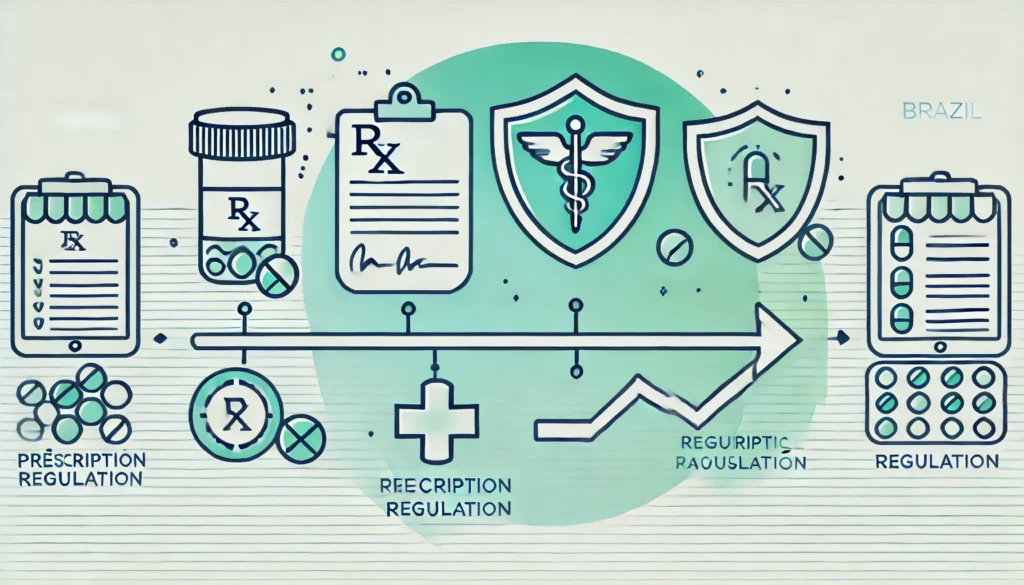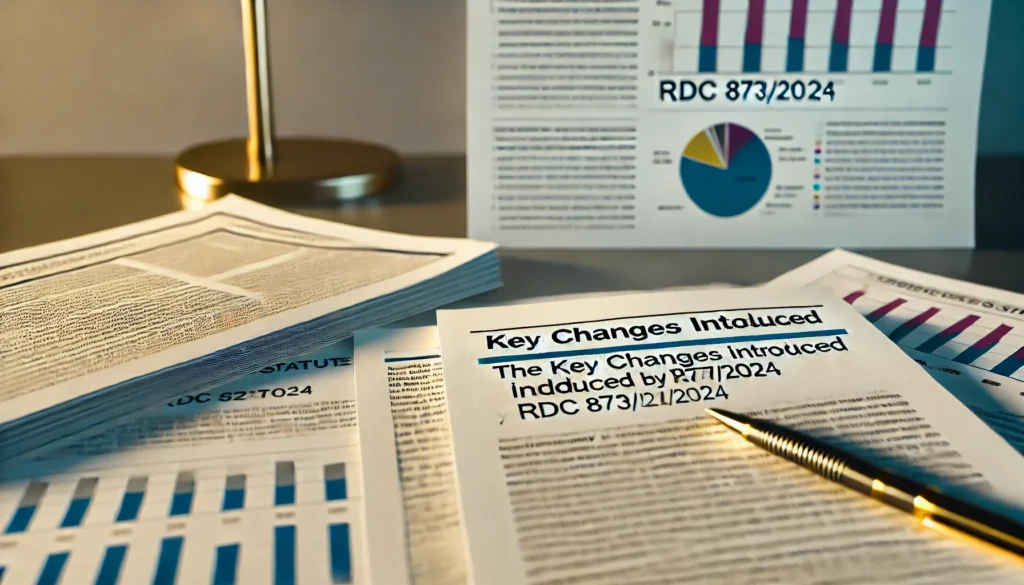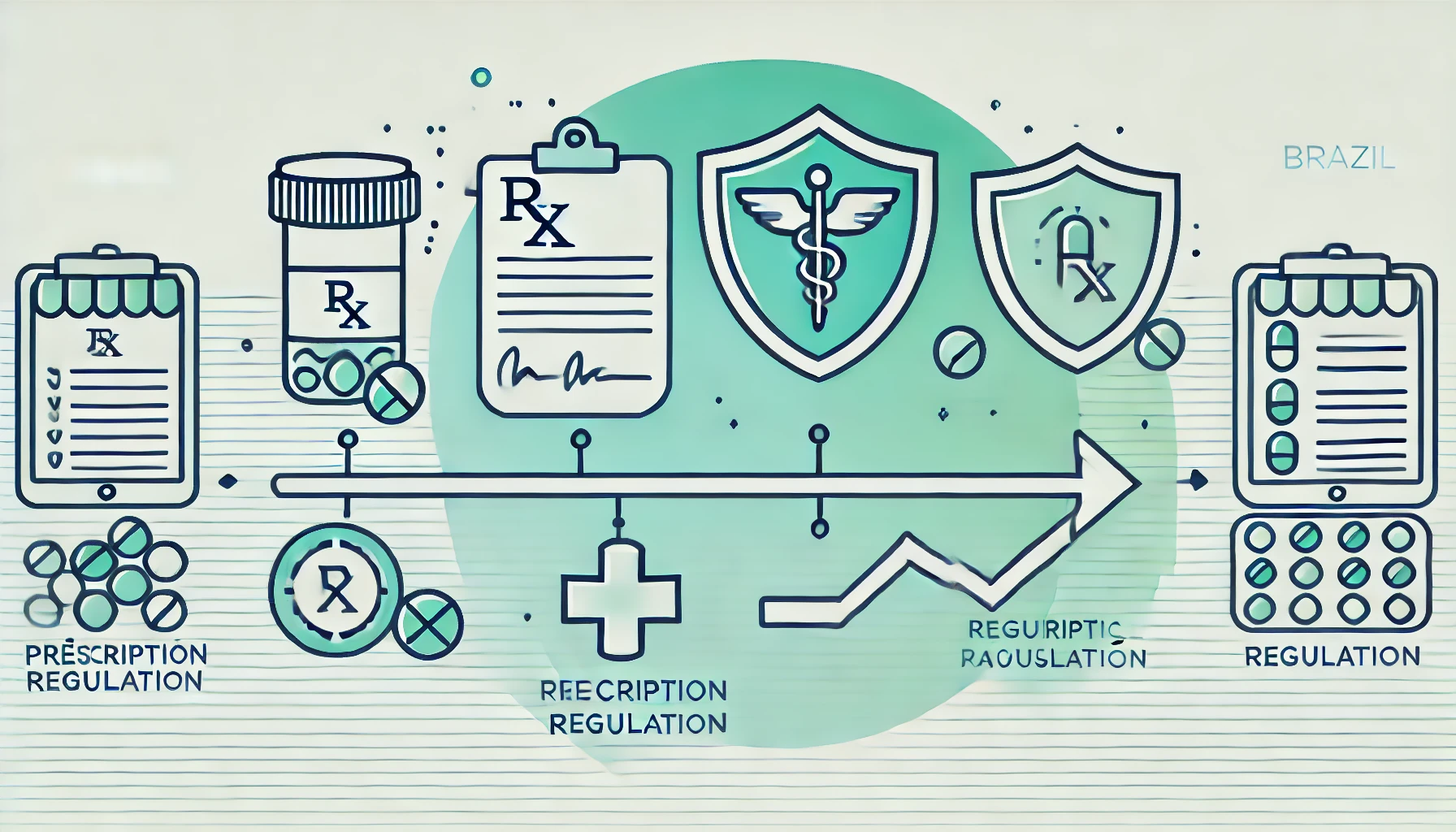How RDC 873/2024 Transforms Healthcare and Opens New Markets for Online Medicine

Introduction to the Evolution of Prescription Regulation in Brazil
The Evolution of Prescription Regulation in Brazil marks a pivotal moment with the introduction of RDC 873/2024, a regulation by the National Health Surveillance Agency (ANVISA). This new regulation introduces the Sistema Nacional de Controle de Receituários (SNCR), or the National System for Prescription Control, enabling seamless nationwide tracking and management of controlled substance prescriptions. With RDC 873/2024, Brazil is advancing digital healthcare and unlocking substantial growth potential for the online medicine market.
This guide delves into the history and transformation of prescription regulation, the game-changing elements of RDC 873/2024, and its promising future for Brazil’s telemedicine and online health sectors.
Schedule a consultation today to discuss how we can support your market entry.

Background on Brazil’s Prescription Regulation
Since the Portaria SVS/MS 344/98 and Portaria SVS/MS 06/99, Brazil has maintained strict controls on prescription drugs, especially those susceptible to misuse. These regulations enforced rigorous protocols for controlled substances, including psychotropics and narcotics, establishing high standards in validation, documentation, and traceability.
Traditionally, controlled prescriptions were only valid within the state of issuance, and cross-state use required additional validation from local health authorities. This limitation posed challenges for patients, particularly those moving between states, and impeded the growth of digital health initiatives. The new RDC 873/2024 system addresses these limitations, opening unprecedented opportunities for Brazil’s telemedicine market.
Schedule a consultation today to discuss how we can support your market entry.

The Transformation: Key Changes Introduced by RDC 873/2024
The Evolution of Prescription Regulation in Brazil reaches a new milestone with RDC 873/2024. This regulation introduces the SNCR, which centralizes prescription management for controlled substances across Brazil. Here’s a breakdown of its impact:
Nationwide Prescription Validity
Before RDC 873/2024, controlled prescriptions were confined by state boundaries. With the new regulation, prescriptions for controlled substances, including psychotropics, now hold nationwide validity for 30 days (20 days for thalidomide). This change enables patients to fill their prescriptions at any pharmacy nationwide, regardless of the state, vastly expanding access to healthcare.
Streamlined Bureaucratic Processes
Previously, cross-state prescriptions required verification by local health authorities, creating administrative burdens for patients and providers. RDC 873/2024 eliminates this requirement, facilitating smoother prescription processes across states. Now, patients who receive care in one state and reside in another can fill prescriptions more easily, thanks to Brazil’s SNCR integration.
Enhanced Security and Control with Digitalization
Each prescription is issued a unique national identifier within the SNCR, enhancing security and reducing the risk of fraud. This level of control is particularly advantageous for online healthcare providers who can now securely manage prescriptions through a centralized digital platform, improving overall compliance.
Gradual Implementation and Full Adoption by 2025
Though the SNCR becomes mandatory on January 1, 2025, it is available for voluntary use to allow state and local authorities to integrate with the new system. All prescription booklets will carry SNCR-generated numbering by July 19, 2026, ensuring a nationwide, standardized system.
Automatic State Identification
The SNCR includes state-specific codes, allowing prescriptions to be tracked to their origin without additional location-based data. This feature streamlines the system and enhances compliance by improving traceability.
Schedule a consultation today to discuss how we can support your market entry.

Brazil’s Booming Telemedicine Market with Prescription Regulation in Brazil with RDC 873/2024
The Evolution of Prescription Regulation in Brazil through RDC 873/2024 introduces significant financial and operational advantages for Brazil’s telemedicine market. By removing barriers to nationwide prescription validity and simplifying regulatory hurdles, the new regulation catalyzes the online medicine sector’s expansion:
- Wider Access for Digital Health Providers
- The nationwide prescription validity introduced by RDC 873/2024 allows digital health platforms to serve patients across the entire country. This capability opens new revenue streams for telemedicine providers and digital pharmacies, allowing them to broaden their reach and cater to more diverse patient demographics.
- Greater Patient Convenience
- RDC 873/2024 offers unprecedented convenience for patients, enabling them to receive prescriptions online and fill them anywhere in Brazil. This advancement is particularly beneficial for those in rural or underserved areas, where in-person healthcare is limited.
- Cost Reduction for Healthcare Providers
- By digitizing prescription management and removing local authority verification, the SNCR minimizes operational costs for healthcare providers. This cost-efficiency is projected to boost profitability for providers and pharmacies, allowing potential cost savings to be passed on to patients.
- Opportunities for International Partnerships
- With a unified prescription system, Brazil’s telemedicine market becomes more attractive to international health companies and pharmaceutical firms. RDC 873/2024 reduces regulatory complexity, simplifying entry into the Brazilian healthcare market for foreign entities.
- Potential for Digital Health Innovation
- The SNCR’s robust tracking capabilities provide a solid foundation for innovations such as AI-driven prescription management, Electronic Health Records (EHR) integration, and telehealth applications. These advancements promise to enhance healthcare quality and compliance further.
Schedule a consultation today to discuss how we can support your market entry.

Conclusion: New Horizons in Brazil’s Healthcare Landscape
The Evolution of Prescription Regulation in Brazil marked by RDC 873/2024 brings transformative change to the management of controlled prescriptions, aligning with Brazil’s telemedicine market growth and opening new opportunities in the online healthcare sector. By establishing a secure, centralized, and nationwide prescription management system, RDC 873/2024 addresses longstanding challenges for patients, providers, and regulators alike.
For digital health companies, this regulation creates avenues for service expansion and financial growth, improving patient accessibility and reducing regulatory complexities. As Brazil advances in digital healthcare solutions, RDC 873/2024 sets a strong precedent for future regulatory innovations that prioritize both safety and convenience.
Addendum
To learn more about the Sistema Nacional de Controle de Receituários (SNCR) or explore how RDC 873/2024 can support your healthcare business, reach out to Hegemoni Regulatory & Business Solutions. Our team offers expert guidance in navigating Brazil’s evolving regulatory landscape, helping you capitalize on the expanding opportunities in the digital healthcare market.
Schedule a consultation today to discuss how we can support your market entry.

